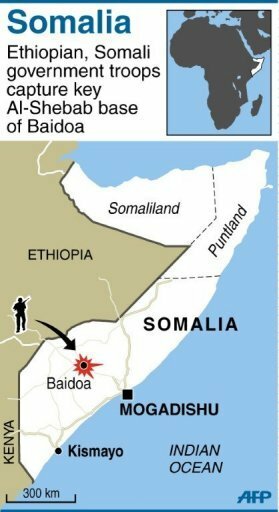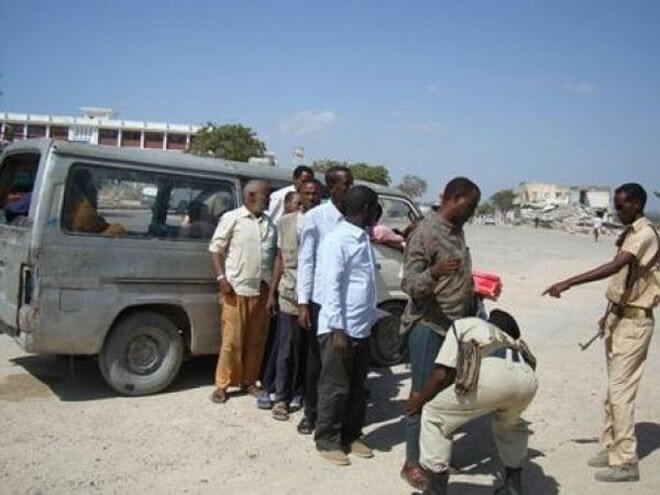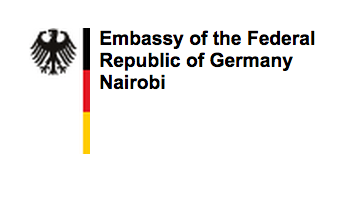Ethiopia, Somali troops seize rebel bastion of Baidoa
 MOGADISHU — Truckloads of Ethiopian and Somali troops on Wednesday captured the strategic Somali city of Baidoa from Al-Qaeda-allied Shebab insurgents, who vowed to avenge their biggest loss in several months.
MOGADISHU — Truckloads of Ethiopian and Somali troops on Wednesday captured the strategic Somali city of Baidoa from Al-Qaeda-allied Shebab insurgents, who vowed to avenge their biggest loss in several months.
The blow to the insurgency coincided with the UN Security Council boosting the strength of an African Union force in Mogadishu by more than 5,000 troops and came on the eve of conference in London aimed at reviving peace efforts.
“We have taken control of Baidoa without a single shot, it is a great day for the people who are now welcoming us warmly,” said Muhidin Ali, a Somali government military commander in the city 250 kilometres (155 miles) northwest of the capital Mogadishu.
Baidoa was the seat of Somalia’s transitional parliament until the hardline Shebab captured it three years ago.
It had since been one of the Shebab’s main bases and its capture leaves the group’s fighters in central Somalia increasingly isolated, with the African Union mission (AMISOM) also chasing them out of the capital.
The insurgents still control large parts of southern Somalia, but a months-old Kenyan land and air offensive there is also making some progress.
Facing major offensives on three fronts, the Shebab reverted to guerrilla attacks including suicide bombings and remained defiant Wednesday.
“The takeover does not mean that the enemy will enjoy the city, there will be more bloodshed,” said Sheikh Mohamed Ibrahim, a Shebab commander.
“The areas they took will only be the graveyards of the Christian invading forces and their apostate Somali militia.”
Shebab fighters claimed they made a tactical retreat as “Ethiopian troops numbering thousands armed with heavy weapons and tanks” poured into the city, Ibrahim said.
The pullback follows the Shebab’s abandoning of most fixed positions in Mogadishu last August after failing to oust the transitional government in four years of bloody battles.
Sporadic shooting was reported late Wednesday on the outskirts of the town, but residents said Baidoa was largely calm.
“We are at the centre now and moving towards every corners of the town, to ensure that we are in full control,” Ali added.
Ethiopian troops, who moved into southern and western Somalia in November, began a major push towards Baidoa on Tuesday.
The Shebab are now “on the run,” Ethiopian government spokesman Bereket Simon said. “We are committed to supporting the Somali people… for the demise of Al-Shebab and the liberation of Somalia.”
Baidoa resident Abdulahi Hassan said Somali and Ethiopian forces had begun establishing a base at “the police station and the main crossroads in town.”
“People are out in the streets watching the soldiers who are gradually moving into the different parts of the city,” Hassan said.
The rebels are already struggling financially and face increasing pressure from regional armies and pro-government forces. The rebels still control the southern port town of Kismayo, a major source of income.
Somali Prime Minister Abdiweli Mohamed Ali called Baidoa “one of the most important cities” in southwestern Somalia, confirming its fall to reporters in London ahead of Thursday’s conference.
Britain’s Guardian newspaper reported on Wednesday that Britain and other EU countries were considering military air strikes on Shebab training camps.
Ali said he would welcome such action against Al-Qaeda-linked Shebab insurgents in Somalia, as long as it did not hurt civilians.
“I have had no discussions of that with the European governments. But targeted Al-Shebab airstrikes are a welcome opportunity,” he said.
Witnesses had said earlier that Shebab fighters and their families were seen fleeing Baidoa towards rebel-held Afgoye, where AMISOM and its allies have vowed to launch a major operation.
“Many people, most of them Al-Shebab families and supporters, are fleeing Baidoa,” said Hussein Ali, a resident. “They are heading towards Afgoye.”
Even as officials and commanders confirmed the fall of Baidoa, the UN Security Council in New York approved increasing AMISOM’s capacity to 17,731 from its current maximum of 12,000.
The force currently consists of around 10,000 troops from Uganda, Burundi and Djibouti. Kenyan troops are expected to now come under AMISOM command, but not Ethiopian forces.
A resolution passed by the 15-nation council also gave the AU force a tougher mandate to attack the Shebab and to substantially increase international funding for the military operation.
The AU force was “authorised to take all necessary measures” with Somali security forces “to reduce the threat posed by Shebab and other armed opposition groups in order to establish conditions for effective and legitimate governance,” the resolution said.
___
AFP
Comments
comments
 Calendar
Calendar






































